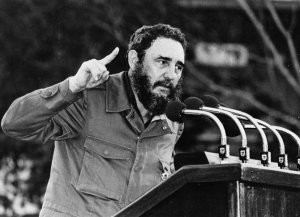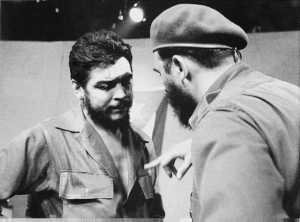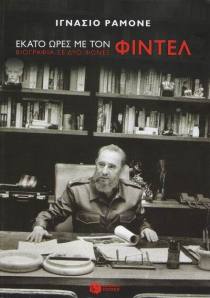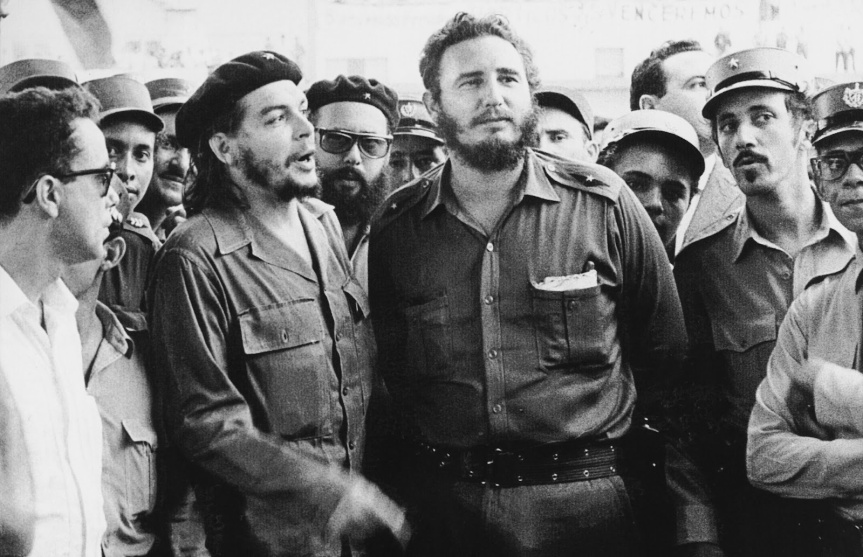Ο Ερνέστο Τσε Γκεβάρα ήταν ένας αντι-ρεβιζιονιστής μαρξιστής-λενινιστής και δυναμικός υποστηρικτής του Ιωσήφ Στάλιν. Και οι δύο ήταν αντίθετοι στις πρακτικές του Τρότσκι και του Χρουστσώφ. Ο Τσε μισούσε την πολιτική του Χρουστσώφ και ήταν χολωμένος με την υποστήριξη που ο Φιντέλ Κάστρο έδειχνε στον σοβιετικό ρεβιζιονισμό
“Θεωρούμε τη δράση του τροτσκιστικού κόμματος ως αντεπαναστατική”, Τσε, 1961
Το Νοέμβρη του 1960, κατά την επίσκεψη του στην Σοβιετική Ένωση, επέμενε στην κατάθεση στεφάνου στον τάφο του Στάλιν, παρά τις παραινέσεις του κουβανού πρέσβη στη Μόσχα ώστε να μην το πράξει. Αυτό συνέβη περισσότερα από τέσσερα χρόνια μετά την έναρξη της περίφημης “αποσταλινοποίησης” της ΕΣΣΔ που ξεκίνησε επί Νικίτα Χρουστσώφ.
Ο συνταξιδιώτης του Τσε, Αλμπέρτο Γκρανάδο, είχε πεί ότι ο Γκεβάρα είχε ανακαλύψει τον Στάλιν (σ.μ: προφανώς εννοεί την πολιτική που εφήρμοσε ο Στάλιν στα χρόνια της ηγεσίας του) στα μέσα της δεκαετίας του 1950 (Anderson, σ.165-166 & σ.565).
Το 1955 όντας στο Μεξικό ο Τσε έστειλε γράμμα στην θεία του υπογράφοντας ως “Στάλιν ΙΙ”:
“Πιστεύω ότι η βασική ιδεολογία στην οποία ο Τρότσκι βασίστηκε ήταν λανθασμένη, τα κρυφά κίνητρα της δράσης του (ήταν) λανθασμένα και τα τελευταία του χρόνια υπήρξαν σκοτεινά. Οι τροτσκιστές δεν έχουν συνεισφέρει τίποτα απολύτως στο επαναστατικό κίνημα – εκεί που έδρασαν περισσότερο ήταν στο Περού αλλά στο τέλος απέτυχαν επειδή χρησιμοποιούν κακές μεθόδους”. (Παράρτημα, όπως αναφέρεται στο κείμενο “Comments on ‘Critical Notes on Political Economy’ by Che Guevara” από το Revolutionary Democracy Journal).
Παρά το γεγονός ότι ο Γκεβάρα βοήθησε στην ασφαλή απελευθέρωση ορισμένων τροτσκιστών από την φυλακή το 1965 (σ.μ: πιθανόν στην Κούβα, δεν αναφέρεται χώρα), ελευθερώθηκαν υπό τον όρο ότι θα σταματούσαν την πολιτική τους δράση. (Revolutionary History 2000, Τομ.7 Αρ., σ.193-195, σ.249).
“Κατά τη διαδρομή μου είχα την ευκαιρία να περάσω απ’ την “επικράτεια” της United Fruit Co., πείθοντας με ακόμη μια φορά πόσο απαίσια είναι αυτά τα καπιταλιστικά χταπόδια. Ορκίστηκα μπροστά σε μια φωτογραφία του παλαιού και θρηνημένου συντρόφου Στάλιν ότι δεν θα ησυχάσω μέχρι να δω τον αφανισμό αυτών των χταποδιών”. (Γράμμα στην θεία του Βεατρίκη, όπου περιγράφει εμπειρίες του απ’ τη διαμονή στην Γουατεμάλα το 1953. Απ’ το βιβλίο Che Guevara: A Revolutionary Life (1997) του Jon Lee Anderson).
“Ο Τρότσκι, μαζί με τον Χρουστσώφ, ανήκει στην κατηγορία των μεγάλων ρεβιζιονιστών” – Γράμμα στον Αρμάντο Χαρτ, 4 Δεκέμβρη 1965
“Ο Τρότσκι έκανε θεμελιώδη λάθη…Οι τροτσκιστές απέτυχαν παντελώς διότι χρησιμοποίησαν κακές μεθόδους” – Άπαντα Κριτική για την Πολιτική Οικονομία, 1964.
“Στα επονομαζόμενα “λάθη του Στάλιν” βρίσκεται η διαφορά μεταξύ μιας επαναστατικής και μιας ρεβιζιονιστικής αντίληψης. Πρέπει να μελετήσεις τον Στάλιν στο ιστορικό πλαίσιο που κινήθηκε, όχι να τον δεις (αποκλειστικά) ως ένα είδος αγριανθρώπου, αλλά στα συγκεκριμένα ιστορικά όρια. Ασπάστικα τον κομμουνισμό εξαιτίας του πατερούλη Στάλιν και κανείς δεν πρέπει να ‘ρθει να μου πει ότι δεν πρέπει να διαβάζω Στάλιν. Τον διάβαζα όταν ήταν κάτι πολύ κακό να διαβάζεις γι’ αυτόν. Αυτό ήταν σε μια άλλη εποχή. Και επειδή δεν είμαι πολύ εφυιής, αλλά και ξεροκέφαλος, συνεχίζω να τον διαβάζω. Ιδιαίτερα σε αυτήν τη νέα περίοδο που είναι ακόμη χειρότερο να διαβάζεις (για τον Στάλιν). Τότε, όπως και τώρα, βρίσκω μια σειρά πραγμάτων που είναι πολύ καλά”. (Γράμμα του Τσε προς τον René Ramos Latour, στις 14 Δεκέμβρη 1957, κορυφαίου μέλους του Κινήματος της 26ης Ιούλη που πέθανε στην μάχη).
“Στην Κούβα δεν υπάρχει τίποτα δημοσιευμένο, εάν εξαιρέσουμε τα σοβιετικά τούβλα, τα οποία φέρουν τη δυσκολία ότι δεν σ’αφήνουν να σκεφτείς – το κόμμα σκέφτεται για σένα και συ πρέπει να το αφομοιώσεις. Θα ήταν αναγκαίο να δημοσιευθούν η πλήρης εργογραφία των Μαρξ, Ένγκελς, Λένιν, Στάλιν (υπογραμμισμένο από τον Τσε στο αυθεντικό έγγραφο της επιστολής) και άλλων σπουδαίων μαρξιστών. Εδώ θα μπορούσαμε να προσθέσουμε τους μεγάλους ρεβιζιονιστές (εάν θέλεις μπορείς να προσθέσεις τον Χρουστσώφ) και επίσης τον φίλο σου τον Τρότσκι ο οποίος υπήρξε και προφανώς έγραψε κάτι”. (Γράμμα στον Αρμάντο Χαρτ Ντάβαλος, πρωτοδημοσιεύθηκε στην εφημ. Contracorriente, Αβάνα, Σεπτέμβρης 1997).
Η πρωτότυπη ανάρτηση στα αγγλικά:
Che Guevara was NOT a Trotskyist
«I have yet to find a single credible source pointing to a case where Che executed ‘an innocent’. Those persons executed by Guevara or on his orders were condemned for the usual crimes punishable by death at times of war or in its aftermath: desertion, treason or crimes such as rape, torture or murder. I should add that my research spanned five years, and included anti-Castro Cubans among the Cuban-American exile community in Miami and elsewhere.”
— Jon Lee Anderson, author of Che Guevara: A Revolutionary Life, PBS forum.
Che Guevara was an anti-revisionist Marxist-Leninist and a strong supporter of Joseph Stalin. He was both opposed to Trotsky and Khrushchev. He hated Khrushchev and was very upset that Fidel Castro supported Soviet revisionism.
“We consider the Trotskyist party to be acting against the revolution.”
— (Che Guevara, 1961).
In November 1960, Che Guevara insisted on depositing a floral tribute at Stalin’s tomb even against the advice of the Cuban Ambassador to the USSR. This was more than four years after Khrushchev’s process of “De-Stalinisation” started.
Guevara’s fellow motorcyclist Alberto Ganado said that it was Stalin that Guevara “discovered” in the mid-fifties (Anderson pp.165-166, p.565).
In 1955 while in Mexico he sent a letter to his aunt signed with the words “Stalin II.”
“I think that the fundamental stuff that Trotsky was based upon was erroneous and that his ulterior behaviour was wrong and his last years were even dark. The Trotskyites have not contributed anything whatsoever to the revolutionary movement; where they did most was in Peru, but they finally failed there because their methods are bad.”(‘Annexes’, p. 402)
— quoted in “Comments on ‘Critical Notes on Political Economy’ by Che Guevara,” from Revolutionary Democracy Journal
Although Guevara helped secure the release of some Trotskyists from prison in 1965, they were freed only on the condition that they cease their political activity (Revolutionary History 2000, Vol.7 No.3) pp.193-195, p.249).
“Along the way, I had the opportunity to pass through the dominions of the United Fruit, convincing me once again of just how terrible these capitalist octopuses are. I have sworn before a picture of the old and mourned comrade Stalin that I won’t rest until I see these capitalist octopuses annihilated.”
– Letter to his aunt Beatriz describing what he had seen while traveling through Guatemala (1953); as quoted in Che Guevara: A Revolutionary Life (1997) by Jon Lee Anderson
“Trotsky, along with Khrushchev, belongs to the category of the great revisionists.”
– – (December 4, 1965: Letter to Armando Ηart)
“Trotsky was fundamentally wrong… Trotskyites ultimately failed because their methods are bad.”
– (Apuntes criticos a la Economia Politica, 1964)
“In the so called mistakes of Stalin lies the difference between a revolutionary attitude and a revisionist attitude. You have to look at Stalin in the historical context in which he moves, you don’t have to look at him as some kind of brute, but in that particular historical context. I have come to communism because of daddy Stalin and nobody must come and tell me that I mustn’t read Stalin. I read him when it was very bad to read him. That was another time. And because I’m not very bright, and a hard-headed person, I keep on reading him. Especially in this new period, now that it is worse to read him. Then, as well as now, I still find a Seri of things that are very good.”
Che wrote on December 14 of 1957 a letter to René Ramos Latour (“Daniel”), National Coordinator of the Movimiento 26 de Julio who died in combat, the following:
“Because of my ideological background, I belong to those who believe that the solution of the world’s problems lies behind the so-called iron curtain and I see this Movement as one of the many inspired by the bourgeoisie’s desire to free themselves from the economic chains of imperialism.”
“In Cuba there is nothing published, if one excludes the Soviet bricks, which bring the inconvenience that they do not let you think; the party did it for you and you should digest it. It would be necessary to publish the complete works of Marx, Engels, Lenin, Stalin [underlined by Che in the original] and other great Marxists. Here would come to the great revisionists (if you want you can add here Khrushchev), well analyzed, more profoundly than any others and also your friend Trotsky, who existed and apparently wrote something.”
— (Che Guevara, Letter to Armando Hart Dávalos published in Contracorriente, Havana, September 1997, No. 9).
ΠΗΓΗ: «The Espresso Stalinist», 6 Αυγούστου 2011. Mετάφραση/Επιμέλεια: Guevaristas.






 Αυτός είναι ο λόγος που έφερα σήμερα μαζί μου ορισμένα έγγραφα. Μην ανησυχείτε πως θα διαβάσω όλα τα έγγραφα εδώ. Πρόκειται μόνο να σας αναγνώσω ορισμένα πράγματα. Επειδή εδώ έχω αυτά που οι ιμπεριαλιστικές και αστικές εφημερίδες έχουν γράψει αναφορικά με την περίπτωση του στρατηγού Γκεβάρα, τι έγραψαν οι εφημερίδες των ΗΠΑ, τα περιοδικά τους, τα πρακτορεία ειδήσεων, οι λατινοαμερικανικές αστικές εφημερίδες και τα έντυπα σε όλο τον υπόλοιπο κόσμο.
Αυτός είναι ο λόγος που έφερα σήμερα μαζί μου ορισμένα έγγραφα. Μην ανησυχείτε πως θα διαβάσω όλα τα έγγραφα εδώ. Πρόκειται μόνο να σας αναγνώσω ορισμένα πράγματα. Επειδή εδώ έχω αυτά που οι ιμπεριαλιστικές και αστικές εφημερίδες έχουν γράψει αναφορικά με την περίπτωση του στρατηγού Γκεβάρα, τι έγραψαν οι εφημερίδες των ΗΠΑ, τα περιοδικά τους, τα πρακτορεία ειδήσεων, οι λατινοαμερικανικές αστικές εφημερίδες και τα έντυπα σε όλο τον υπόλοιπο κόσμο.  Αρκετές δεκαετίες αργότερα, μιλώντας στον Ιγνάσιο Ραμονέ για το βιβλίο «Εκατό ώρες με τον Φιντέλ», ο Φιντέλ μιλά για την εποχή εκείνη της αναχώρησης του Γκεβάρα απ’ το νησί.
Αρκετές δεκαετίες αργότερα, μιλώντας στον Ιγνάσιο Ραμονέ για το βιβλίο «Εκατό ώρες με τον Φιντέλ», ο Φιντέλ μιλά για την εποχή εκείνη της αναχώρησης του Γκεβάρα απ’ το νησί.


